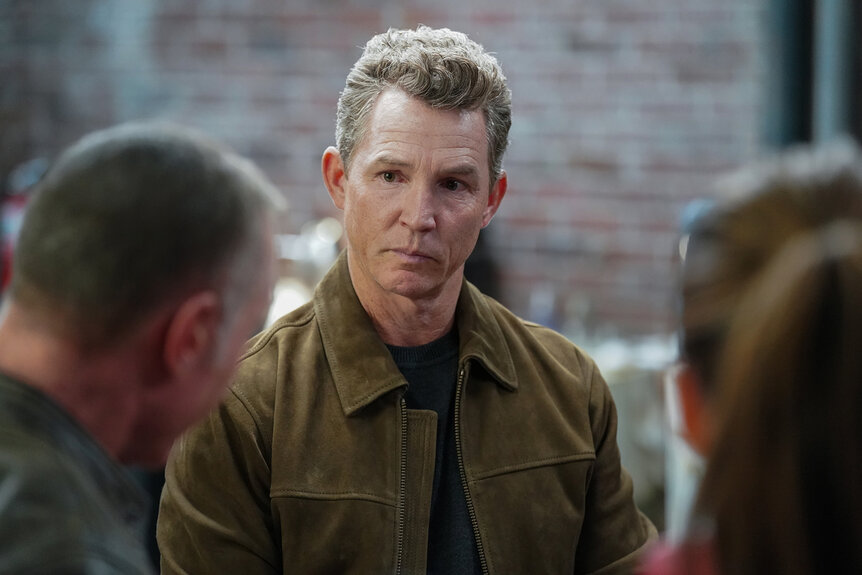Intriguing Newcomer: Deputy Chief Charlie Reid’s Role in Chicago P.D.
Chicago P.D. has introduced a provocative newcomer to its latest season, Deputy Chief Charlie Reid, portrayed by the talented Shawn Hatosy. Reid is an enigmatic character, a commanding police officer who indulges in unconventional methods. Instantly intriguing, on the surface, he seems like a flexible yet supportive authority figure. However, there’s a mysterious goal this man appears to be pursuing. Let’s delve into the intricacies of this complex character and the notable actor who brings him to life.
In the twelfth installment of Chicago P.D., audiences meet Deputy Chief Charlie Reid. His credentials hail from the Bureau of Organized Crime, a high-ranking position with a discerning eye on the Intelligence Unit. His guidance is far from benign though – Reid’s interest lands more on the side of meticulous observation ready to be repurposed to his advantage. From his entrance, Reid remains an elusive enigma.
He intervenes during a crisis, stands with Voight’s team, and seems genuinely invested in his duty. Despite displaying these seemingly benign traits, an unsettling undercurrent trails Reid. He’s polite, agreeable even, but his favours carry an underlying note of veiled threat. That sense of foreboding isn’t misguided – Reid emerges as a tainted player, partaking in clandestine affairs, gang dealings, and orchestrating discreet acts of violence. He doesn’t merely flirt with unethical practice; Reid is submerged in the murky waters of political corruption.
Illustrating Charlie Reid, Hatosy deftly integrates allure and peril, producing a vibe that is simultaneously intriguing and unsettling for the characters and viewers. An expert in emotional juggling, one moment he’s comforting a distraught officer, the next he’s unearthing compromising secrets. His composure, an eerie calmness, seems to amplify his ominous aura. The calculated precision, the ironclad control in his conversation – hints at a man always crafting his next move. Reid isn’t a simplistic antagonist; he creates cognitive dissonance in viewers, drawing them in despite his actions.
His first interaction with Voight is purely professional, yet beneath that facades lurks a touch of hidden intent. He’s not simply there to render support — Reid is present to analyze, dominate, and sway. Discovering an act of misconduct by Officer Torres related to a confidential informant, he opts not for retribution but offers up a strange facsimile of camaraderie. When a team member is abducted, Reid provides aid in securing the ransom. However, even this deed carries an undertone of pecuniary gain; nothing Reid does seems to be devoid of some ulterior motive.
Charlie Reid plays a part in the demise of a confidential source. He doesn’t directly cause the event, but he cleverly orchestrates the situation while keeping his hands clean. Reid maintains a chilling aura even while emerging as a major instigator in the unfolding drama.
One of the captivating aspects of Reid’s journey in Chicago P.D. is his power play with Voight — rather than physical aggression or outright threats, he uses cunning and subtle might. If Voight exemplifies street-smart justice, Reid is the shady political counterpart: a debonair exterior masking the dirt within. The two represent contrasting philosophies. Reid posits protection of the city as an excuse for strategic maneuvering, bending rules and shattering trust as necessary while Voight, despite his shortcomings, still battles from a place of genuine conviction, even when at odds with the law.
Their dynamics take on the form of a strategic game – a chessmatch of wits and maneuverings. The climax of this power struggle results in a surprising checkmate, one that defies expectations.
In an unexpected twist during the season’s climax, Reid meets his end at the hands of a young man, Renny Otero, whose father met a similar fate indirectly through Reid. Voight artfully orchestrates the scene — he isn’t directly involved in the act, but he ensures Renny’s knowledge of Reid’s whereabouts. It’s a grisly conclusion to a shadow speckled character, leaving the audience questioning: was Voight’s decision justified, or has he transformed into a variation of what he swore to eradicate?
Charlie Reid represented more than an unethical officer — he functioned as a mirror, urging the team, and by extension the audience, to reevaluate themselves. His presence raised imperative questions of morality and courage. Remained passive or rebelled? And at what cost? For the fans of Chicago P.D., his character incited tension, unpredictability, contributing some of the most memorable moments of the season.
Whether loved or despised, Reid’s presence was always met with an emotional response when he graced the screen, cementing his status as a memorable character. While Deputy Chief Charlie Reid’s tenure was brief, his impact was indelibly powerful. Through Shawn Hatosy’s riveting portrayal, Reid’s character added dynamic interplays and layers of drama to the narrative of Chicago P.D.
His character may no longer feature in the series, however, the reverberations of his consequential action have just begun; delivering an enduring storyline set to unfold.


